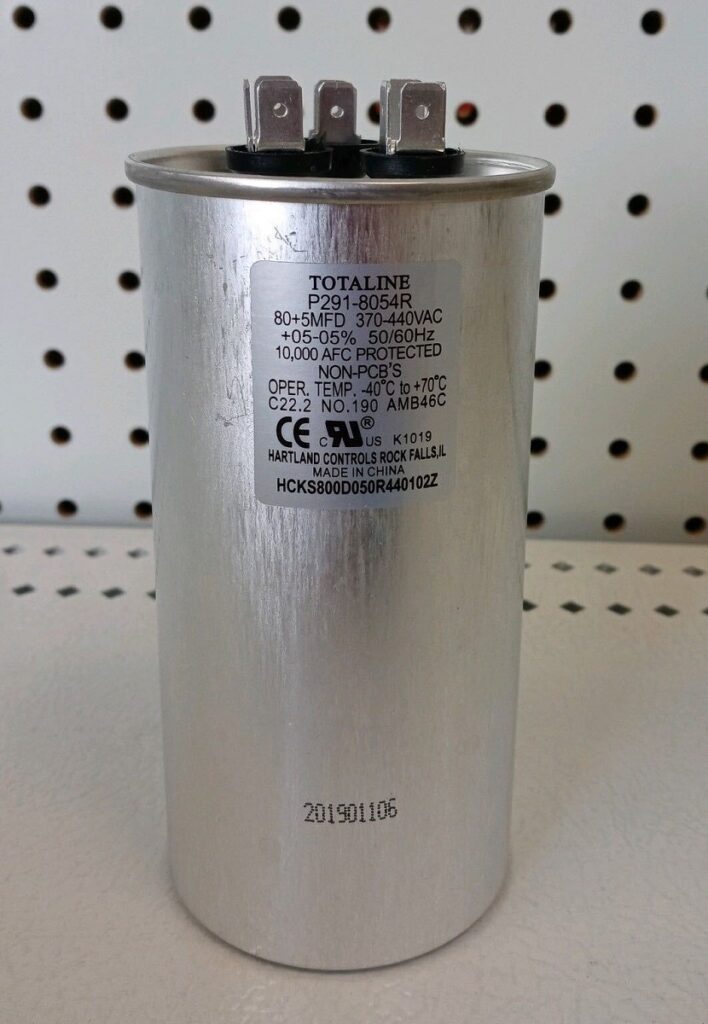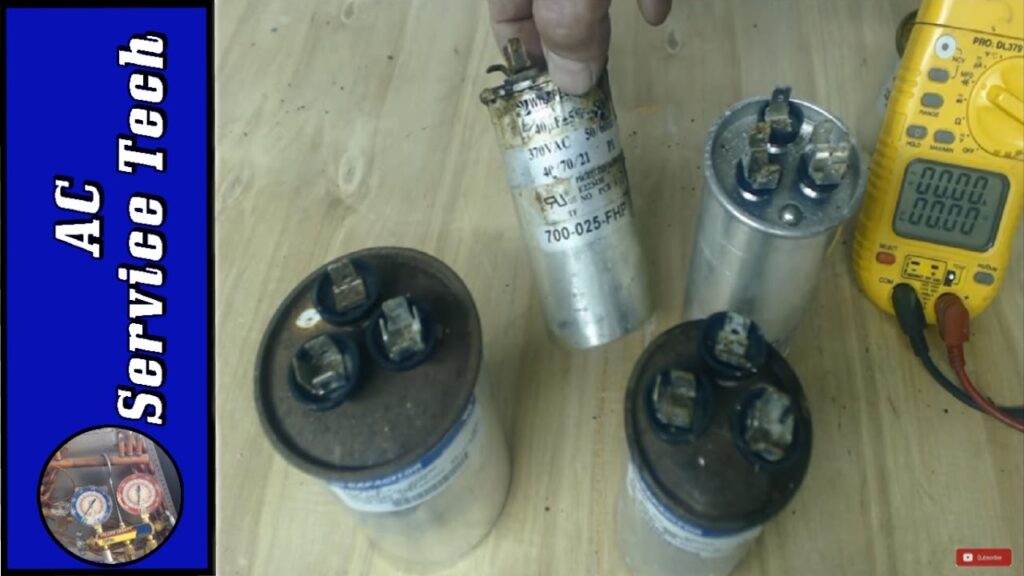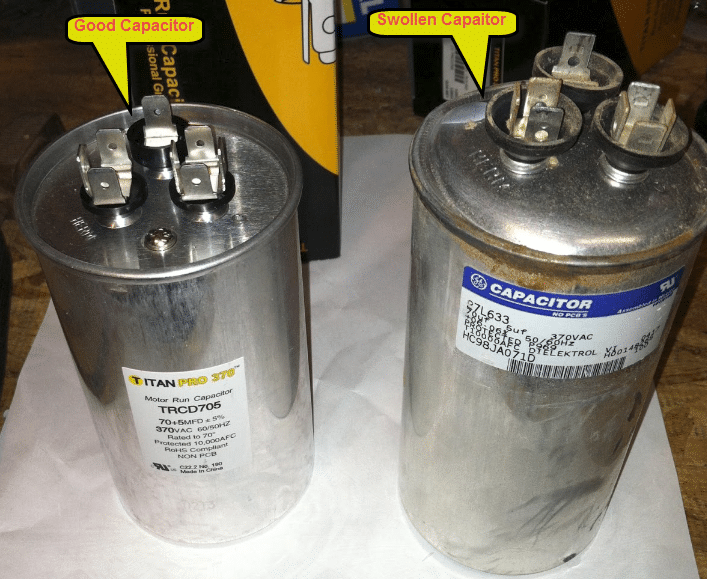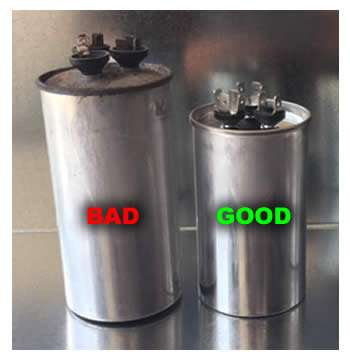Introduction to AC Capacitors
Air conditioners rely on a variety of components to work efficiently and effectively, one of which is the AC capacitor. You might be wondering what role it plays in your AC system and, importantly, how can you tell if it’s not functioning properly?
Understanding the Functionality of AC Capacitors
An AC capacitor is responsible for storing electricity and providing the initial boost of power needed to start your air conditioning system. Essentially, it functions like a battery and is crucial to the operation of the fan, blower motor, and compressor.
How Crucial is an AC Capacitor in an AC System
The AC capacitor plays a vital role in the smooth operation of your AC system. It’s worth noting that symptoms like irregular cooling, humming noises, hard starting, and the AC system not working at all can all point towards a bad AC capacitor. Understanding these symptoms and seeking professional help in time can save you from more costly repairs down the line. Always remember, when it comes to your AC system’s crucial components, regular scrutiny and prompt attention to potential issues can save you time and money.
Understanding the Symptoms of a Bad AC Capacitor
AC capacitors play a pivotal role in the functioning of your air conditioning system. Just like any other component, AC capacitors can face issues over time, impacting your comfort and the system’s efficiency. Recognizing the symptoms of a problematic AC capacitor can help you address the issue promptly, thus avoiding more complex and expensive repairs.
Uneven or Inconsistent Cooling
One of the most common signs of a faulty AC capacitor is uneven or inconsistent cooling. When your AC capacitor starts failing, your air conditioning system might struggle to maintain the set temperature or evenly cool your spaces. You might notice a drastic variation in temperature from room to room. Understand that this inconsistency is a clear indication of an impending capacitor problem.
Rising Energy Bills Due to AC Capacitor Issues
A failing capacitor forces your system to work harder, leading to increased energy consumption. If you’ve been noticing a consistent rise in your energy bills without any significant change in usage, it could be due to a bad AC capacitor.
Frequent and Unexplained Breakdowns
Capacitor issues often lead to abrupt and frequent breakdowns. If your air conditioning system has been consistently acting up despite regular maintenance, it’s time to have a professional check the AC capacitor. Remember, early detection and repair can increase the durability and efficiency of your system.

This image is property of www.officialhvac.com.
You might not think much about the capacitor in your air conditioner, but it’s a vital component in its operation. A capacitor is responsible for storing energy and sending a jolt to start the motor. If it’s too weak or faulty, it can lead to several issues that might affect your comfort and the system’s efficiency. This article will assist you in understanding the symptoms that indicate a bad AC capacitor.
Difficult Start or Slow Startup of the AC System
One of the first telltale signs of a bad capacitor is a noticeable difficulty whenever you try to start your air conditioning system or when it takes longer than usual to kick start. If your capacitor is in poor condition, it won’t be able to give the necessary jolt to start the engine, which may cause a slow or difficult start.
Strange Noises Coming from the AC unit
Another symptom is unusual noises. If you notice humming or buzzing sounds coming from your AC, it might suggest that the capacitor is not storing enough power to keep the system functioning smoothly.
The AC Shuts Off by Itself, Intermittent or Erratic Operation
Lastly, your AC might shut off by itself or operate in an erratic manner if its capacitor is faulty. It’s because a bad capacitor can’t provide consistent power, causing intermittent disruptions to the operation of your cooling system. Recognizing these signs early can save you from sudden discomfort due to an ill-functioning AC.
By monitoring your AC unit closely, minor issues can be detected and fixed before they escalate into major problems.

This image is property of i.ytimg.com.
Recognizing Advanced Symptoms of a Bad AC Capacitor
If your air conditioning system is suffering from a bad AC capacitor, it is important to understand the symptoms, as timely diagnosis can save from costly repairs. Let’s discuss some common symptoms of a faulty AC capacitor.
Actual Damage or Leaks in the Capacitor
If your AC capacitor is failing or has already failed, you might see visible damage on the capacitor itself. This could be in the form of bulges or leaks, with an oily substance on the surface. If you see these signs, it’s a clear indication that your AC’s capacitor needs a replacement.
Issues with the Motor Function of the AC System
A faulty AC capacitor can also impact the motor operation of your AC system. You may notice that the system takes a longer time to start, or it could lock up completely and stop running, resulting in limited or no cool air.
Irregular Blower Operation – An Indication of a Bad AC Capacitor
Irregular blower operation can often be traced back to a failing AC capacitor. This is often shown through the system unable to start and stop on its own or uneven cooling.
Terminology used such as “start and stop”, “limited or no cool air”, and “uneven cooling” are symptoms to look out for when questioning if your AC capacitor might be bad. It’s critical to address these issues quickly to ensure the longevity of your AC system.

This image is property of myhvacprice.com.
Have you ever wondered why your air conditioning system isn’t chilling your home as effectively as it used to, or why the energy bills have suddenly increased? The culprit might be a bad AC capacitor. As an essential component in your AC system, a malfunctioning capacitor can have a series of adverse effects.
Potential Damage to the AC System
When the capacitor fails, it can potentially cause damage to the compressor, the fan, and the overall AC system. The compressor may begin to work overtime to compensate, causing other parts of your system to overwork and eventually wear out.
Increased Maintenance and Repair Costs
A faulty capacitor is not only harmful to your AC system; it also brings an unwelcome increase in maintenance and repair costs. It may cause your system to randomly stop working or demand frequent servicing.
Reduced Lifespan of the AC System due to Continuous Strain
The continuous strain on an AC system with a bad capacitor can greatly reduce its lifespan. Without repair or replacement, the constant stress will inevitably lead to the complete breakdown of your AC system. Stay alert, and catch these symptoms early to save your cooling system.

This image is property of sunset-air.com.
A well-functioning AC unit is essential for your comfort at home or in the workplace. If you’re experiencing issues with your AC, the problem could lie with the AC capacitor. Understanding the symptoms of a bad AC capacitor aids in identifying issues early and getting them fixed.
Preventive Measures and Regular Maintenance
Preventive measures are the most reliable way to avoid the hassle of a bad AC capacitor. Regular servicing of your AC system helps in preventing problems from escalating into bigger ones.
Scheduled AC System Inspections
This process involves regularly scheduled inspections to monitor the functioning of your AC system. Particularly, you want to keep an eye out for symptoms such as fluctuations in temperature, irregular noises, or the inability of your AC to start.
Early Identification and Replacement of Bad Capacitors
Symptoms of a bad AC capacitor are clear indicators to consider its replacement. The earlier you identify these signs, the sooner you can get the capacitor replaced and prevent further potential damage.
Ensuring Professional and Qualified AC Maintenance Services
Lastly, always use professionals for AC maintenance and repairs. Qualified technicians have the knowledge to handle these systems appropriately and diagnose any problems accurately. They ensure your AC system operates smoothly and efficiently. Utilizing professional services can save you time, reduce the risk of damage, and ensure the longevity of your AC system. A bad AC capacitor can cause several issues in your air conditioning system. Understanding the symptoms of a bad capacitor can help you better diagnose potential problems with your AC unit. This post will guide you through the necessary details.
Necessity of Professional Help in AC Capacitor Issues
If your AC is not functioning well, it might be due to a bad capacitor. Unusual noises, a sudden increase in your electricity bill, inability of the AC to produce cold air, or frequent tripping of the circuit breaker are some of the common indications. However, these symptoms might not always signify a faulty capacitor as they are also common in other AC problems. Hence, professional assistance is required to accurately diagnose the issue.
Benefits of Hiring Professional AC Services
While it’s tempting to solve AC issues on your own, hiring a professional service can save you from potential risks. They are skilled to identify the signs and perform the necessary replacements without any errors. Moreover, they ensure that your system maintains its warranty.
Risks Associated with DIY Fixes and Replacements
Attempting to replace your AC capacitor yourself might seem a cost-effective solution, but it can lead to more harm than good. Proper handling is crucial to prevent electrical shock or further damage to your AC unit.
Importance of Proper AC Capacitor Replacement and Installation
When the AC capacitor is not functioning, your air conditioning unit can not perform effectively. Therefore, appropriate replacement and installation is critical to ensure the optimal functioning of your AC. Only professional services have the experience and correct tools to ensure safe and proper installation.
A key component of your air conditioning unit is the AC capacitor. Recognizing the symptoms of a bad capacitor can be crucial in maintaining the efficiency and longevity of your unit.
The Consequences of Ignoring the Symptoms
Ignoring symptoms of a failing AC capacitor can lead to escalating issues. A failed capacitor may lead to severe damage in your AC unit, requiring more expensive repairs or even a full replacement. Also, a failing capacitor can make your AC work harder than necessary, leading to increased energy bills.
The Value of a Functional AC Capacitor to a HVAC System
A fully functional capacitor is paramount to an effectively running HVAC system. It regulates the electrical flow to and from the system’s motors, ensuring consistent power delivery. Without this, your AC’s performance will drastically reduce, leading to uncomfortable temperatures in your indoor spaces.
Conclusion: The Importance of Understanding the Symptoms of a Bad AC Capacitor
In summary, understanding the signs of a bad AC capacitor and addressing them promptly is not only beneficial to your wallet but critical to your comfort. With the right knowledge and timely action, you can keep your AC unit in great shape and your indoor environment in optimal condition.
